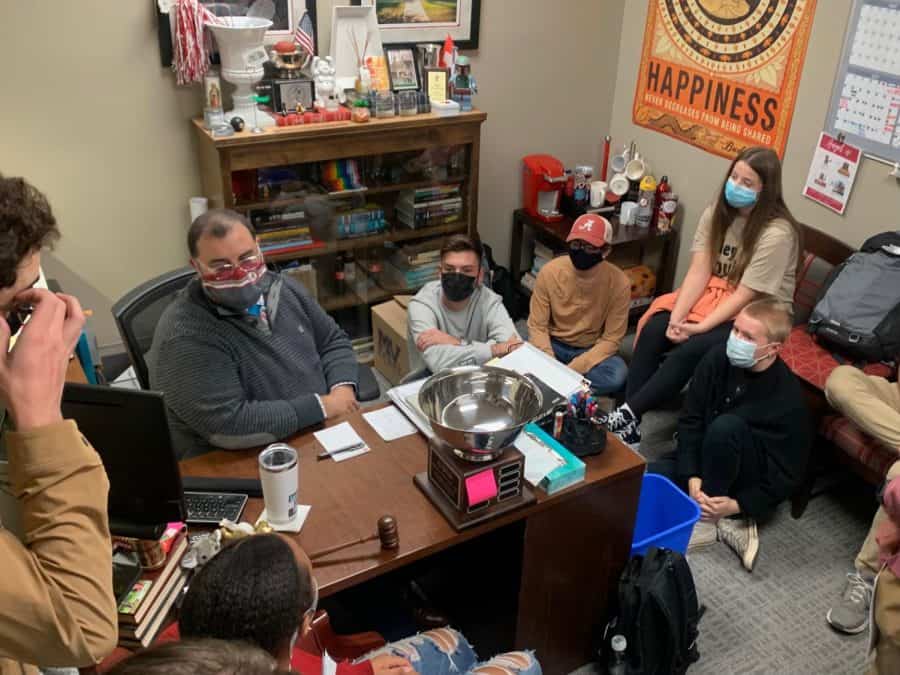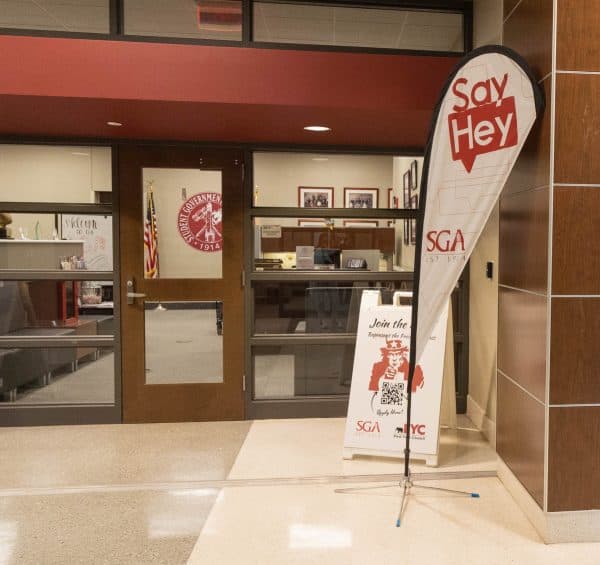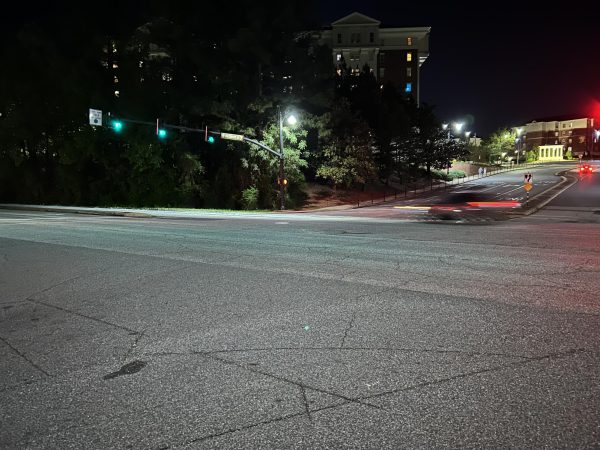Elections Board addresses homecoming election, discloses violation reports
SGA Adviser Angel Narvaez-Lugo invites students into his office on Monday, Nov. 1, during a sit-in to protest the results of the homecoming queen election.
November 2, 2021
The Student Government Association Elections Board released a statement Tuesday refuting claims about the homecoming election, denying that a runoff is necessary and disclosing all violation reports.
Contesting the Election
Nov. 2 was the deadline for the SGA Elections Board to review petitions against the homecoming queen election. They met on Tuesday to review all petitions against the homecoming election, and they will turn them over to the Judicial Board for review once their hearing is complete.
Students could submit petitions to SGA Executive Secretary Colin Marcum until Oct. 27, and three students filed an appeal for judicial review.
On Monday, the day before the Elections Board released its statement, more than 50 students attended a sit-in at the SGA Office on Monday to protest the actions of the Elections Board throughout homecoming week, including a timeline error that invalidated the election from the beginning.
The protest, held before the Elections Board released its statement, was arranged by a group of anonymous students and promoted on social media. They distributed copies of the SGA Elections Manual for review.
“The Elections Board recognizes and takes seriously our duty to ensure that UA students can participate in a fair election process, and on behalf of the entire board, we regret not engaging and responding to the Crimson White reporters and other students who have reached out to us in recent weeks regarding the homecoming queen election,” the Elections Board wrote. “However, we would now like to share several points of fact in response to claims made by the Crimson White in recent articles so that the student body has all the information necessary related to this issue.”
Runoff
Vice President for Student Life Myron Pope wrote in an email to the student body on Saturday that there is no basis for the election to be contested or overturned.
The homecoming election timeline posted on the SGA website listed Thursday, Oct. 21, as the date for a runoff if necessary. The Elections Manual, which includes guidance for homecoming elections, outlines two policies for runoff elections.
Executive elections, which involve a full student body vote and result in one winner like the homecoming queen election, require a majority vote to win. The other policy, for Senate elections, which are voted on by students in a particular college and result in multiple winners, requires a tie for a runoff.
This year’s winner, McLean Moore, received 47% of votes.
In the absence of a specific threshold for homecoming queen contests, the Elections Board said it employed the criteria for Senate elections. They deemed the application appropriate because homecoming queen is not an executive office and a runoff election was not feasible with the timing of homecoming events.
Pope wrote in his email that several aspects of the Elections Manual were “not written with homecoming queen in mind.” He called for the creation of a “diverse student task force” to draft clear rules for homecoming elections in the future.
Helen Fleming, a sophomore who attended the sit-in, said changing the Elections Manual is not an adequate solution.
“A lot of the focus has been shifted to the Elections Manual — which is undeniably flawed — but it also is not the problem, because the Elections Manual that [currently] exists wasn’t followed,” Fleming said. “The election was conducted for the interests of the SGA however they saw fit.”
Timeline Error
The homecoming election timeline must be posted at least 21 class days ahead of the election, per the Elections Manual. Failure to meet this requirement invalidated the election from the beginning.
The Elections Board said homecoming was intended to coincide with the current special Senate election. When the Elections Board learned of the error, they rescheduled the special Senate election but not the homecoming election.
The Elections Board wrote in its statement that the high turnout for homecoming indicated there was sufficient notice for the election. Regardless of turnout, the Elections Board did not postpone the election after failing to meet the 21-day notice requirement.
SGA adviser Angel Narvaez-Lugo said on Monday that the election should have been postponed.
Forms
The Elections Board claimed that all financial disclosure form submission deadlines were met by all candidates.
As of Oct. 16, Moore had only reported one financial disclosure form on Oct. 4 with $0 in expenditures. Moore’s second financial disclosure form should have been publicly available by Oct. 13 at the latest but remained missing at least through Oct. 16.
In her second financial report, the elections website listed another form dated Oct. 4. This second form initially reported $0 in contributions and expenditures, but was modified after the deadline to report $226 in expenditures.
Modification of a form after a deadline is an intermediate violation, but the Elections Board said they allowed several candidates to correct errors on form because they weren’t found to be “intentional or malicious on the part of the campaign teams involved.” According to the Elections Manual, intent is not required to determine minimal, minor or intermediate violations.
The elections website did not include a form for Moore dated Oct. 11 at any point during the campaign, although a report filed on this date was necessary to meet the reporting criteria outlined in the Elections Manual. Moore should have reported her third form by Oct. 18. Instead, her third financial disclosure was dated Oct. 19.
Multiple other candidates failed to disclose their financial disclosure forms by the required deadlines throughout the campaign.
The Elections Board reported technical difficulties that impeded the reporting process. The statement said Moore missed deadlines when submitting forms due to a “technical error” and Moore’s campaign team reached out to the Elections Board after the deadline to fix the issue.
Candidates are required to report total expenditures, which the manual defines as “all goods and services purchased by or donated (including monetary or in-kind contributions) to a candidate or campaign for use in the election or use in any way furthering that candidate’s campaign.”
Moore did not report her professional-quality campaign videos on any of her financial disclosure forms. If campaign materials are donated, candidates are required to estimate the fair market value of the contribution. The Elections Board said there was “no indication” Moore’s videos were professionally produced.
The Elections Board said it exercised “discretion and extended leniency” to the candidates involved. There is no provision in the Elections Manual for discretion or leniency.
Sassy Mediknow, a sophomore majoring in music therapy who attended the sit-in protest, said she was concerned with the integrity of student government elections in general rather than the homecoming election.
“Yes, homecoming queen is not the most important of elections, but it’s really more the principle of it for me,” she said. “If we can’t trust the SGA to have a fair election for something as inconspicuous as homecoming queen, how can we trust them to have a fair election for things that really matter?”
Violations
The Elections Board confirmed on Nov. 2 that Moore received zero infraction points. Only one formal complaint was filed against Moore concerning a sign that exceeded size limits.
The Elections Board met for a hearing on the complaint but “insufficient evidence was found to substantiate the allegations.”
According to reports from the Elections Board on Tuesday, there were 23 violation complaints filed during the campaign: 12 against Montana Fouts, nine against Savanah Lemon, one against Moore and one against the Elections Board.
Fouts was the only candidate who received infraction points. The Board reported that she committed three minor violations and three minimal violations for a total of 12 points.
Results
The Elections Board did not release official results of the homecoming queen election three class days after the election as required. They did, however, release unofficial results of the referendum vote within the timeframe required.
The Elections Board claimed that “homecoming queen vote counts are treated differently by tradition.” There is no guidance for this in the manual or any other written policy.
Student protest
During Monday’s sit-in at the SGA Office, Narvaez-Lugo invited the students into his office to discuss their concerns. At least six other SGA senators and three Executive Council members observed the protest, including Speaker of the Senate Darius Thomas, Executive VP Sam Rickert and VP for Diversity, Equity and Inclusion Lauren Gilonske.
“I think I’ve shared with y’all my frustration with this position and this organization and the way that it’s run,” Narvaez-Lugo said.
College of Arts and Sciences Senator John Dodd said the student protest was also a protest against the Machine, a more-than-century-old underground political organization on campus that controls elections.
“Even though it’s on a small scale, the student government is still a democracy,” Dodd said. “The Machine field of politics here at The University of Alabama will one day expand to state politics and Alabama. Eventually [these Machine candidates] are going to become your state representatives, they’re going to become your state senators, and they’re going to carry out this corruption that they learned in college and make it a part of their career forever.”
Narvaez-Lugo said the SGA wanted to release a statement addressing the homecoming election controversy, but “did not feel empowered to do so” since the Elections Board is an independent organization.
Alexander Lindenfelser, a senior majoring in political science, said the protest was about democracy in student government.
“The homecoming election isn’t about Ms. Moore,” Lindenfelser said. “This is our time to say that we do not believe that the Machine represents all of us and show that we are here and that we want a say in our student government.”
Sean Atchison, a sophomore majoring in international studies, said he contested the election to support increased transparency in the SGA. He said Pope’s email “crossed a line” because of the ongoing judicial appeal against the Elections Board.
“It was bull—-,” he said. “I believe that the SGA should be run by students, and there should have a certain level of autonomy from the administration. The administration can not decide when they don’t like something that they’re going to step in. Dr. Pope has put the administration’s weight behind a particular narrative, and nothing can be done without the shadow of that.”
The protest was an opportunity to point out transgressions by the SGA for Garrett Burnett, a junior double majoring in history and spanish.
“Obviously everyone sees the homecoming election as the main issue,” Burnett said. “But I think it runs so much deeper than that. A lot of people don’t realize the blatant corruption of the SGA, the corruption of the Elections Board.”
Atchison said he feels clear on what students are fighting for.
“We’re going to continue to keep having these problems as long as we are not talking about the Machine,” he said. “This is not just about the Elections Manual. This is not just about that email. This is about ending the Machine once and for all.”











